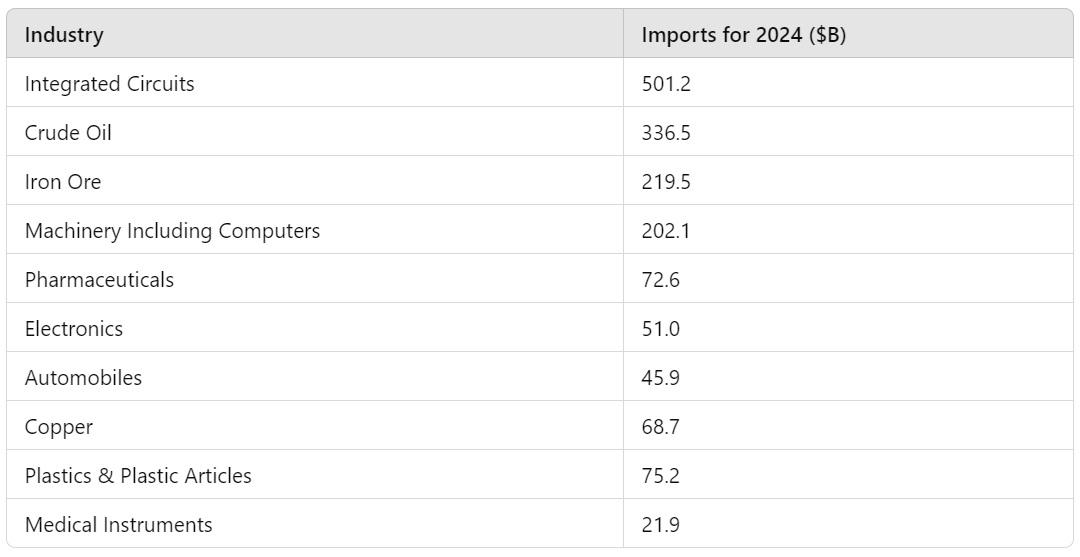
China imports a diverse range of products to meet its extensive industrial and consumer needs. Among the top imports are electronics, oil and gas, machinery, and pharmaceuticals. These imports play a crucial role in supporting Chinese businesses and consumers by ensuring access to essential and advanced products.
In 2024, China’s imports are projected to reach around $2.8 trillion, reflecting an increase compared to previous years. For example, in 2023, the import value was approximately $2.7 trillion. Fluctuations in the Chinese Yuan against other major currencies have also impacted import costs, making some international purchases more expensive.
Top 10 Products Imported to China in 2024
These import values highlight China’s diverse industrial and consumer needs, reflecting significant expenditures on electronics, oil, and machinery, among other essential goods. The pharmaceutical sector also represents a substantial portion of China’s imports, underscoring the importance of healthcare products in the country. Additionally, the import of integrated circuits highlights China’s technological and industrial requirements.
1. Integrated Circuits
China imports a significant number of integrated circuits, valued at around $501.2 billion. This sector is crucial for supporting the nation’s vast electronics manufacturing industry. China imports these components primarily from Taiwan, South Korea, and Japan, reflecting its strong trade relationships with these technological hubs.
2. Crude Oil
Crude oil imports are vital for meeting China’s energy demands, with an estimated value of $336.5 billion. These imports are essential for sustaining the country’s industrial output and energy production. China sources crude oil mainly from Saudi Arabia, Russia, and the United States, ensuring a stable supply of energy.
3. Iron Ore
Iron ore is critical for China’s steel production, supporting its extensive construction and manufacturing sectors. The estimated value of iron ore imports is $219.5 billion. China imports iron ore primarily from Australia and Brazil, maintaining its position as the world’s largest importer of this essential raw material.
4. Machinery Including Computers
Machinery imports, including industrial and agricultural machinery, are vital for maintaining and expanding China’s manufacturing and agricultural sectors. The estimated value of machinery imports is $202.1 billion. These imports aid in the automation and modernization of industries, boosting China’s economic growth.
5. Pharmaceuticals
Pharmaceutical products are essential imports for China, with an estimated value of $72.6 billion. The country imports a wide range of medications and medical supplies to support its healthcare system. These imports are primarily sourced from Germany, Switzerland, and the United States, ensuring that the Chinese healthcare sector has access to the latest treatments and medical innovations.
6. Electronics
Electronics, including computers, mobile phones, and other consumer electronics, form a significant part of China’s imports, valued at approximately $51.0 billion. These imports cater to the high demand for advanced technology and consumer electronics in the Chinese market, sourced mainly from South Korea, Japan, and the United States.
7. Automobiles
The automotive sector in China imports a considerable number of vehicles, including cars, trucks, and other automotive vehicles, estimated at $45.9 billion. This sector is crucial for meeting the demand for personal and commercial transportation. China imports vehicles primarily from Germany, Japan, and the United States.
8. Copper
Copper is essential for China’s electrical, construction, and industrial applications, with imports valued at $68.7 billion. Copper’s role in renewable energy and electronics makes it a vital import for sustaining China’s infrastructure and technological advancements.
9. Plastics & Plastic Articles
Plastics and plastic articles are crucial for various industries in China, including packaging, automotive, and construction. The estimated value of these imports is $75.2 billion. China imports these products from Germany, South Korea, and Japan, reflecting the demand for versatile and durable plastic materials.
10. Medical Instruments
Medical instruments, including diagnostic equipment and surgical tools, are vital imports for China’s healthcare industry, with an estimated value of $21.9 billion. These imports ensure that the healthcare sector remains equipped with the latest technology and equipment, sourced from the United States, Germany, and Japan.
Conclusion
China’s robust import market in 2024 offers significant opportunities for global traders. Like any country, China has specific regulations, processes, and procedures for importing goods. Businesses that fail to comply with Chinese import regulations may face risks, complications, and delays.
For businesses looking to import into China, reliable logistics services are crucial. Connecta provides comprehensive logistics solutions, including freight forwarding, international shipping, warehousing and distribution, and supply chain management. With Connecta managing your import logistics, you can concentrate on expanding your business while ensuring smooth and efficient shipments.
Contact Us for more details and discover how to connect with our extensive trading network in China. Connecta’s expertise in transportation and logistics will help you navigate the complexities of importing into China, ensuring your products reach their destination efficiently and on time.











